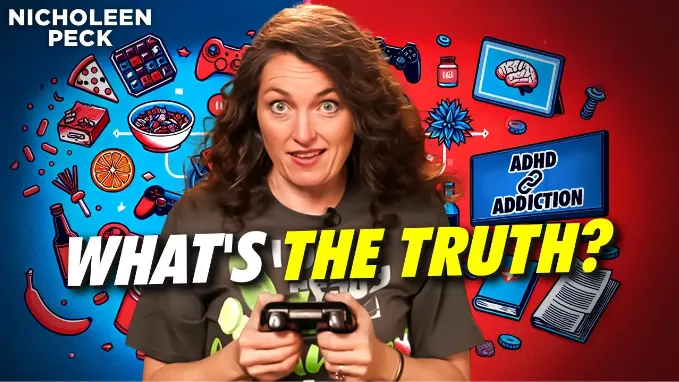
Are ADHD And Addiction Related? (food, gaming, etc)
Are ADHD and Addiction Related? Exploring Connections and Strategies
Hello, I'm Nicholeen Peck, and I travel worldwide teaching about parenting, effective communication, building strong family bonds, child development, education, habit training, and more. I approach these topics through the lens of the principle of self-government. In this article, I want to explore the relationship between ADHD and addiction.
ADHD, or Attention Deficit Hyperactivity Disorder, is quite prevalent in our society. It manifests differently in different individuals, making it challenging to diagnose. There are mixed opinions about ADHD, especially when it comes to its connection to addiction. A common question parents ask is: if my child seems to have an addiction, do I attribute it to their ADHD, or do I address it differently?
From my years of therapeutic treatment for troubled teens, I've observed that many of them had ADHD along with other conditions like OCD, RAD, or FAS. These conditions often come with increased impulsivity, which can contribute to addictive behaviors. However, I don't believe that ADHD itself leads directly to addiction. Instead, it’s the increased impulsivity that might make someone more susceptible to addiction.
People with ADHD often get distracted easily and have difficulty following through on tasks. On the flip side, they can also hyper-focus on something that interests them deeply, to the exclusion of everything else. This duality in focus can make it challenging to manage addictive behaviors if they hyper-focus on cravings or impulses.
Addiction can take many forms: behavioral, thought-related, or substance-related. When discussing addiction, it’s crucial to understand what happens in the brain. Typically, addiction involves hyper-focusing on one thing, making it hard to stop thinking about it. ADHD can contribute to this hyper-focus, but it’s not exclusive to those with ADHD. Anyone can develop an addiction by ruminating on cravings or impulses.
So, what can be done to address addiction, whether or not ADHD is involved? The key is self-government, which involves five critical steps: analyze, plan, act deliberately, communicate effectively, and review. These steps keep individuals on the path of self-governance.
Analyze: Identify the problem and determine your end goal. For example, if you’re addicted to gaming, acknowledge the negative consequences of excessive gaming, like isolation or lack of productivity.
Plan: Develop a strategy to address the addiction. When a craving hits, recognize it as a craving and consider your options. Instead of gaming, you might decide to exercise or engage in another productive activity.
Act Deliberately: Follow through with your plan. Deliberate action is crucial in breaking the cycle of addiction.
Communicate Effectively: Discuss your progress with someone who can support you and help you stay accountable.
Review: Reflect on your actions and make necessary adjustments to your plan.
These steps can help anyone, with or without ADHD, manage and overcome addiction. In my experience, foster children with ADHD successfully overcame various addictions by applying self-government principles and consistently using these five keys.
Additionally, skills like following instructions, accepting no answers, and accepting consequences are vital in overcoming addiction. These skills provide the tools needed to manage cravings and make deliberate choices.
Self-government is the recipe for success in managing ADHD, OCD, ODD, or any other challenges, including addiction. If you want to learn more about these skills and principles, check out the full-length class on this channel titled "The Not So Known Secret to Parenting Success.

